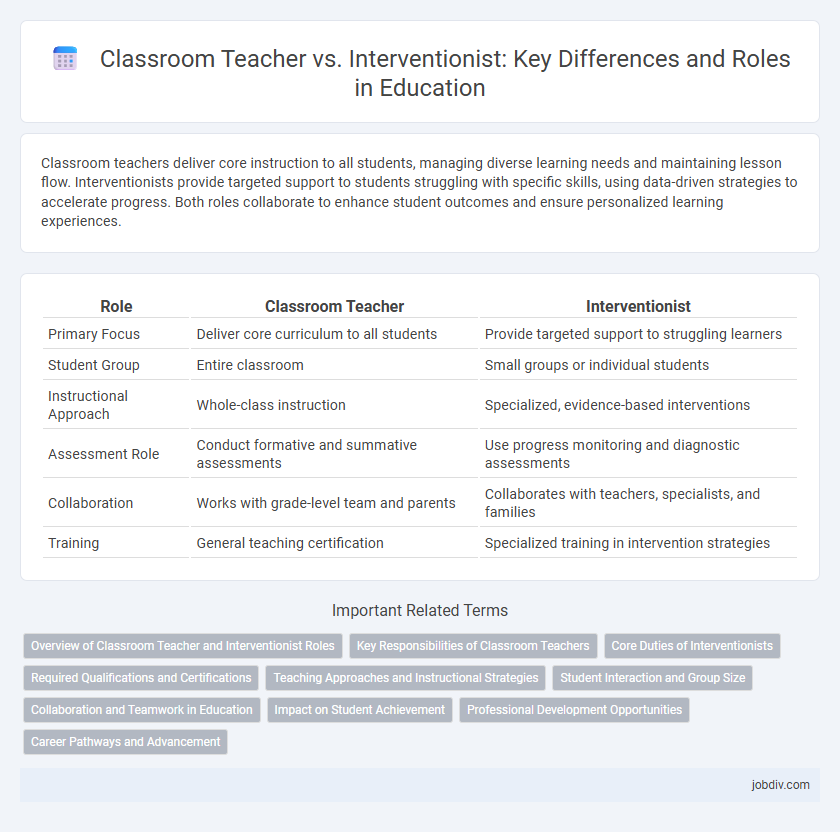Classroom teachers deliver core instruction to all students, managing diverse learning needs and maintaining lesson flow. Interventionists provide targeted support to students struggling with specific skills, using data-driven strategies to accelerate progress. Both roles collaborate to enhance student outcomes and ensure personalized learning experiences.
Table of Comparison
| Role | Classroom Teacher | Interventionist |
|---|---|---|
| Primary Focus | Deliver core curriculum to all students | Provide targeted support to struggling learners |
| Student Group | Entire classroom | Small groups or individual students |
| Instructional Approach | Whole-class instruction | Specialized, evidence-based interventions |
| Assessment Role | Conduct formative and summative assessments | Use progress monitoring and diagnostic assessments |
| Collaboration | Works with grade-level team and parents | Collaborates with teachers, specialists, and families |
| Training | General teaching certification | Specialized training in intervention strategies |
Overview of Classroom Teacher and Interventionist Roles
Classroom teachers design and deliver core curriculum lessons, manage daily student activities, and assess overall academic progress across multiple subjects. Interventionists provide targeted support by addressing specific learning gaps, implementing specialized strategies, and monitoring improvement through data-driven interventions. Both roles collaborate to enhance student outcomes, balancing general instruction with focused skill development.
Key Responsibilities of Classroom Teachers
Classroom teachers are responsible for delivering core curriculum instruction tailored to diverse learning styles, managing classroom behavior, and assessing student progress through formative and summative evaluations. They create lesson plans aligned with state standards, facilitate collaborative learning environments, and communicate regularly with parents and stakeholders to support student development. Classroom teachers also identify students needing extra support and coordinate with interventionists to address academic challenges effectively.
Core Duties of Interventionists
Interventionists specialize in providing targeted support to students who struggle with core academic skills, using data-driven strategies to address learning gaps and enhance student outcomes. Their core duties include assessing student progress, developing individualized intervention plans, and collaborating closely with classroom teachers to tailor instruction. Unlike classroom teachers who deliver general curriculum to all students, interventionists focus on remediation and acceleration for those needing additional academic support.
Required Qualifications and Certifications
Classroom teachers typically require a state-issued teaching license in elementary or secondary education, with a bachelor's degree in education or a related field as a minimum qualification. Interventionists often need specialized certifications such as Reading Specialist credentials or endorsements in special education, emphasizing expertise in targeted instructional strategies and student support. Both roles demand ongoing professional development and adherence to state education standards to maintain certification and effectiveness in diverse learning environments.
Teaching Approaches and Instructional Strategies
Classroom teachers primarily employ whole-group instruction, differentiated teaching, and formative assessments to address diverse student needs within a general curriculum framework. Interventionists focus on targeted, data-driven instructional strategies designed to remediate specific learning gaps, often using intensive, small-group or one-on-one sessions. Both roles utilize progress monitoring tools, but interventionists rely more heavily on specialized interventions such as phonics programs or math fluency drills to accelerate student mastery.
Student Interaction and Group Size
Classroom teachers typically manage larger groups of 20 to 30 students, facilitating whole-class instruction and encouraging peer interaction, which fosters social skills development. Interventionists work with smaller groups or individual students, often ranging from 3 to 6, allowing for targeted, personalized support that addresses specific learning gaps. The more focused setting with an interventionist enhances student engagement through tailored feedback and intensive skill-building activities.
Collaboration and Teamwork in Education
Classroom teachers and interventionists collaborate closely to enhance student learning by sharing expertise and aligning instructional strategies. Effective teamwork involves regular communication, joint planning, and data-driven decision-making to address diverse student needs. This collaborative approach fosters a supportive educational environment that promotes academic growth and social-emotional development.
Impact on Student Achievement
Classroom teachers deliver core instruction and continuously assess student progress, fostering a strong foundational understanding across subjects. Interventionists target specific learning gaps using evidence-based strategies, which accelerates skill mastery for struggling students. Collaborative efforts between these roles significantly enhance overall student achievement by addressing diverse educational needs.
Professional Development Opportunities
Classroom teachers often access professional development programs centered on curriculum design, classroom management, and student engagement strategies vital for general instruction. Interventionists receive specialized training in assessment techniques, evidence-based intervention methods, and data-driven decision-making crucial for addressing learning gaps. Both roles benefit from ongoing workshops and collaborative learning communities tailored to enhance instructional effectiveness and student outcomes.
Career Pathways and Advancement
Classroom teachers typically follow a career pathway that advances through grade-level specialization, leadership roles such as department head, and administration positions like principal or curriculum coordinator. Interventionists often progress by gaining expertise in specialized support services, moving into roles such as literacy coach, behavior specialist, or instructional coordinator. Both career paths require continuous professional development and offer opportunities for impact on student learning and school-wide educational strategies.
Classroom Teacher vs Interventionist Infographic

 jobdiv.com
jobdiv.com